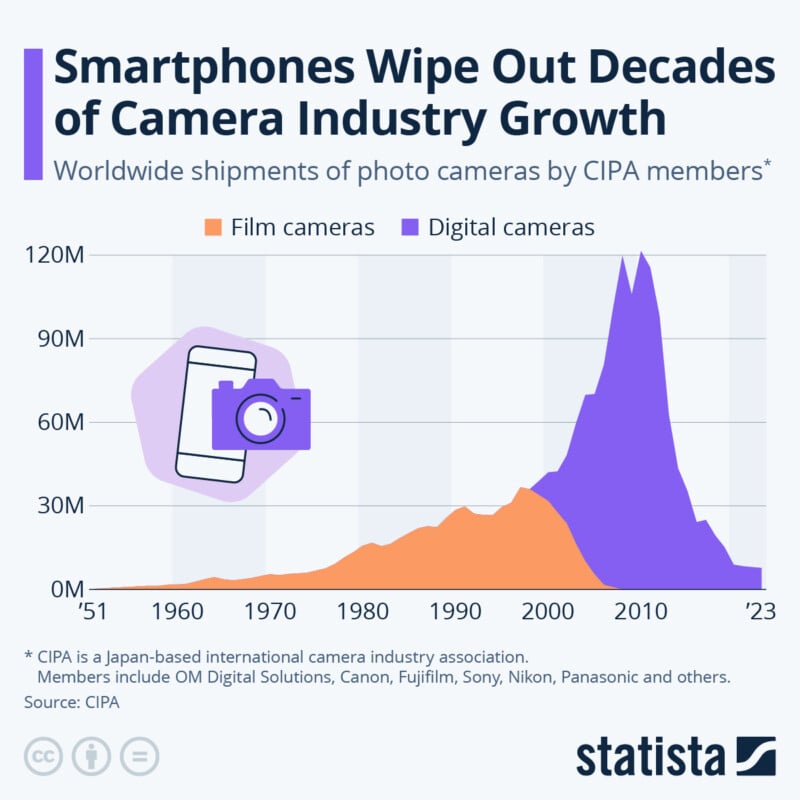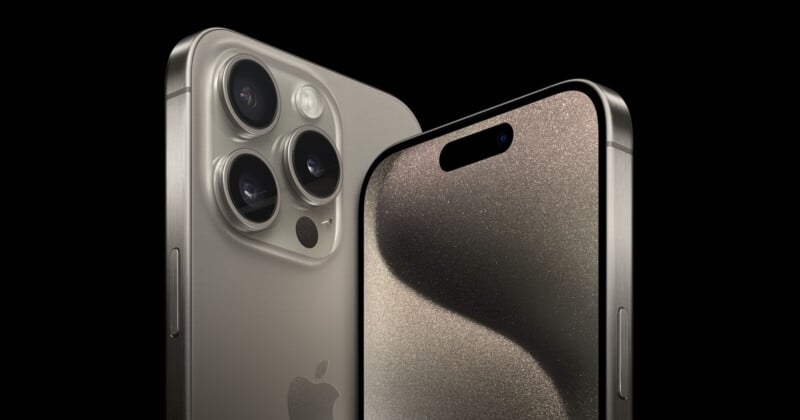Steve Jobs Foresaw the Collapse of the Camera Market 6 Years Before it Happened
![]()
Although Steve Jobs remains a complicated figure for many who knew him best, nearly everyone agrees that the successful inventor and businessman was a legendary visionary. Jobs was on the ground floor of many technological innovations, including personal computers, digital music players, and smartphones. His work also had a massive impact on photography.
A PetaPixel staffer is currently reading Steve Jobs, the 2011 authorized biography of Jobs written by American historian and journalist, Walter Isaacson. In the 656-page book, written at Jobs’ request before his passing in October of 2011, the iPhone chapter sheds light on what made Jobs so successful: He could predict future consumer behavior and technological innovation with uncanny accuracy.
In 2005, two years before Apple unveiled the first iPhone, Jobs worried about how phones would impact the company’s smash hit, the iPod.
“[Jobs] was also obsessing about what could mess us up,” Apple Inc. chairman Art Levinson told Isaacson. “The device that can eat our lunch is the cell phone,” Levinson recalls Jobs concluding.
Fascinatingly, the example Jobs used to prove his point was the digital camera market, which he said was “being decimated now that phones were equipped with cameras,” per Isaacson. Jobs worried the same could happen to the iPod if phones started including music players.
This was in 2005 when the camera market was not facing devastation. In fact, as PetaPixel‘s coverage of a new 70-year camera industry chart showed last week, the digital camera market was booming at the time, skyrocketing toward a historical peak around 2010 before plummeting a few years later.

A 2021 article noted that the “fall of the camera industry” started between 2010 and 2012, and became very apparent in 2013. Lensvid editor Iddo Genuth cited the increased adoption of smartphones with good capabilities as a significant factor. Once smartphone cameras became “good enough,” people bought fewer cameras, especially entry-level point-and-shoot models.
What did Jobs see in 2005 that would eventually come true many years later? After all, at the time the iPhone launched in 2007, a couple of years after Jobs’ bold proclamation about the digital camera market’s fate, smartphone cameras were horrible. They could technically take pictures, but nothing that would make anyone think twice about their need for a proper digital camera. The original iPhone launched with a single two-megapixel rear camera, and it didn’t get much better quickly.
Isaacson’s glowing characterization of Jobs sums it up:
Was he smart? No, not exceptionally. Instead, he was a genius. His imaginative leaps were instinctive, unexpected, and at times magical. He was, indeed, an example of what the mathematician Mark Kac called a magician genius, someone whose insights come out of the blue and require intuition more than mere mental processing power. Like a pathfinder, he could absorb information, sniff the winds, and sense what lay ahead.
What Jobs sniffed in the wind was that eventually and inevitably, smartphone camera technology would reach that point of “good enough.” Much like Jobs was worried that once phones had a music player that was “good enough,” the iPod would die, he predicted that smartphones would kill dedicated digital cameras.

Rarely one to leave things up to fate or luck, Jobs took his fears about what could hurt Apple and turned them into strengths. Ultimately, phones did kill the iPod — but it was the iPhone that delivered the death blow. Although phones didn’t completely destroy the camera market, the iPhone has played an instrumental role in fundamentally changing the camera market’s nature and size. The entry-level camera market has shrunk nearly to nonexistence, and point-and-shoot cameras are no longer a priority for camera makers, even as they enjoy a nostalgia-fueled resurgence of sorts.
Whether Jobs’ camera market prediction was a self-fulfilling prophecy, like his beliefs about the iPod’s doom, it’s fascinating to consider just how far ahead he could accurately predict technology and the multitude of ways people might use it. Perhaps if camera makers had been on the same wavelength, the photo industry would look much different today.
Image credits: Featured image created using an asset licensed via Depositphotos and an image courtesy of Apple.